
Nobody could have been more misunderstood in history than a medieval woman. All her bodily functions were seen as essentially problematic – and possibly evil. Plus her entire sex was forever in the dock for tempting Adam in the Garden of Eden.
Despite this – medieval woman could succeed!
And yet despite all the bonkers views of female anatomy – you get a medieval woman like Eleanor of Aquitaine wielding massive power in the Middle Ages. In fact, there’s a string of female rulers in the medieval period who are far more impressive than many of their male counterparts.
In her excellent book Medieval Women – Oxford University research fellow Henrietta Leyser uncovers some astonishing nonsense that people believed about women in the medieval period. She also finds that women could exercise real power and influence but they really had to climb a mountain of very odd prejudices.
The bigotry faced by a medieval woman – blame the Greeks!
It seems Aristotle (pictured below) has to take a big part of the blame. The great Greek philosopher was hugely influential at the height of the Middle Ages. Having been dead for nearly two thousand years that was quite an achievement. Not only was he Alexander the Great’s tutor – he was a massive misogynist.
Aristotle just didn’t like women. And that seems to have chimed with another big influence in the medieval period – the Roman doctor Galen. Both Galen and Aristotle wrote some complete nonsense about females that remained unchallenged until the modern era.
Medieval woman and her dangerous seed!
Galen believed that men and women both produced “seed” for reproduction. Male seed was precious but female seed was dangerous. In fact, as Leyser notes, women had to purge themselves of “excess seed” through menstruation. Or if that didn’t work – lots of exercise!
If they didn’t expel the overproduced seed, these wretched women might find it difficult to breath and suffer from a condition called “uterine suffocation”. One academic in the fourteenth century even described how a midwife could assist in unwanted seed removal – but I’m going to spare you the details!
Medieval woman – the perils of menstrual blood!
Pliny – another Roman – was also influential and he issued dire warnings about the effects of menstrual blood. Apparently, it could turn wine sour, make crops barren, fruit fell from trees, bee hives died and dogs who tasted it got rabies! If, heaven forbid, a man was silly enough to have intercourse with a menstruating woman then the child was likely to have red hair (a bad thing it would seem) and go down with leprosy (definitely a bad thing).
An older woman who was still menstruating could “poison” a child in its cradle just by looking at it. The vapors from below exuded through her eyes to whatever she was looking at. So concerned were clerics in the thirteenth century about the evil effects of periods that they even debated whether the Virgin Mary could possibly have ever menstruated. With deep regret, they were forced to conclude that she must have done.













I think people at the time also believed that women could determine the gender of an unborn child. In medieval Europe, the Roman Catholic Church forbade physicians from trying to mitigate the pain and agony of pregnancy and labor; believing that it was woman’s lot in life to suffer for the alleged sins of Eve in the “Garden of Eden.”
Oh Please! If men really believed all this rubbish, how come they thought they were sooooo clever?
I know – crazy. But on the positive side, there were some very powerful women in the Middle Ages including my favorite queen, Eleanor of Aquitaine. Nobody messed with her!